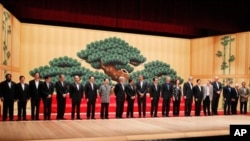Leaders of the 21-nation Asia Pacific Economic Cooperation (APEC) forum have concluded their summit in Yokohama, Japan pledging to move forward with trade and investment liberalization, and concrete steps to create an Asia-Pacific free trade area.
In what they call their Yokohama Vision, leaders say trade and investment liberalization continues to be their core objective, requiring them to strengthen and deepen regional economic integration.
They say APEC will move toward a more concrete vision of the Free Trade Area of the Asia-Pacific, including what they call comprehensive, high quality liberalization to address "next generation" trade and investment issues.
U.S. President Barack Obama and fellow APEC leaders stood behind Japan's Prime Minister Naoto Kan as he read out the Yokohama declaration.
To continue being a driving force for the global economy, said Mr. Kan, members will have to deepen economic integration and focus on sustainable growth.
No specific target is set for achieving a comprehensive free trade agreement. The declaration does not specifically mention issues such as currency disputes, discussed at the G20 summit in Seoul, South Korea.
Citing uncertainty amid recovery from the global financial crisis, APEC members endorse G20 calls for strong, sustainable and balanced growth and a commitment to fight trade protectionism.
APEC leaders meeting in Indonesia in 1994 pledged that industrialized countries would achieve free and open trade and investment by 2010, with a target of 2020 for developing economies.
The Yokohama declaration says APEC is well on track toward achieving these goals, with increased trade and investment flows and economic growth, but more work needs to be done.
On the final day of the APEC summit, President Obama met leaders of eight other countries negotiating a new Trans-Pacific partnership (Australia, Brunei, Chile, Malaysia, New Zealand, Peru, Singapore and Vietnam).
A White House statement said they agreed to conclude an agreement as swiftly as possible, calling it the most advanced pathway to integrating Asia-Pacific economies.
For President Obama, the APEC summit ended an intense 4-nation Asia trip that also took him to India and Indonesia, as well as the G20 summit in Seoul.
Despite disappointment in failing to achieve at least for now a free trade agreement with South Korea, U.S. officials say Mr. Obama managed to strengthen key partnerships, and underscore U.S. influence and power in important regional organizations.
